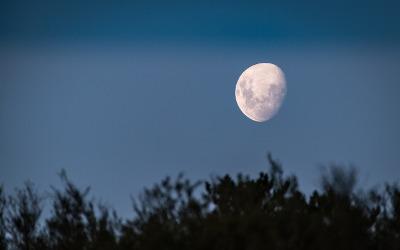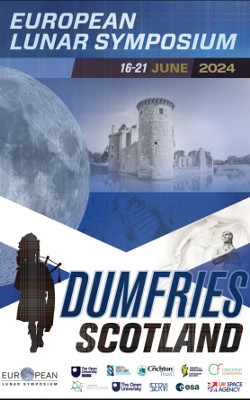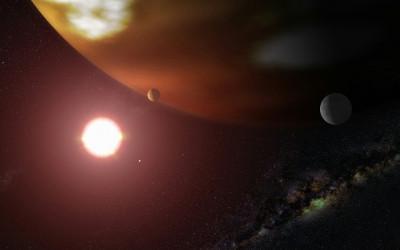OU hosts the 2024 European Lunar Symposium

The 2024 European Lunar Symposium (ELS), which will be hosted by The Open University (OU) in Scotland from 16-21 June, will reveal progress in and plans for exploring the Moon.
Chaired by Mahesh Anand, Professor of Planetary Science and Exploration in the OU’s Faculty of Science, Technology, Engineering and Mathematics, who co-founded this conference in Berlin 12 years ago, it brings together the global lunar community to share scientific knowledge and plans for the future exploration of the Moon.
Professor Anand said:
“The purpose of this conference is to open research into the Moon to more parts of the world. In Europe, we have no other such focus meeting on the Moon. Over the last 20 years, we have seen how lunar exploration has grown as more players get involved. The four nations reach of the OU means that as the conference moves across Europe, this year we can host it in Scotland, where our footprint for lunar research is not as strong as in England.
“We have been able to offer a full programme of research findings and networking opportunities for the delegates and a dedicated programme of public engagement and outreach and educational opportunities for the local community.”
The OU has a strong track record of lunar research, and nine OU researchers will speak and present on recent findings and further exploration plans.
These are:
- Dr Lee White, Post Doctoral Research Associate in Lunar Volatiles, who will speak on: Heterogeneous distribution of volatiles in recrystallised lunar melt inclusions: insights from atom probe tomography
- Dr Alexander Verchovsky Project officer in the School of Physical Sciences at the OU, will speak on: Discovery of a unique extra-lunar material in the Apollo 17 drill core sample using C, N and noble gas abundance and isotopic composition analyses
- Dr Sungwoo Lim, Visiting Fellow, OU (Senior Lecturer at the University of Surrey), who will present his work with the OU on: Microwave heating demonstrator (MHD) payload – barebone system validation
- James Cole, who recently finished his OU PhD, will speak on: Investigating the optimal microwave heating of diffuse and granular icy lunar simulants for water extraction
- Adam Chopra, a second year PhD student at the OU, will speak on Gas purification of the output of molten salt electrolysis for lunar ISRU
- Alan Butcher, Visiting Professor, OU, will speak about the application of the latest instrumentation for non-destructive analyses of lunar samples, enabling new discoveries about their geological histories.
These speakers will present their findings linked to our understanding of the geochemical evolution of the Moon and the potential utilisation of lunar water as a resource. They will also discuss the possibilities for building on the Moon and harnessing local natural resources at mission destinations, instead of taking all needed supplies from Earth.
Three more OU researchers will present posters about their research on building payloads for lunar missions and exploring the history of volatiles (chemicals that become gasses) in the lunar interior through the analysis of lunar meteorites (rocks found on Earth that were ejected from the moon by impacts of asteroidal meteoroids or possibly comets):
- Dr James Mortimer, Project Officer (Lunar Volatiles) on ProSPA Development as part of ESA's PROSPECT Package-Current Status
- Victoria Levy, PhD student on Development of a miniature magnetic sector mass spectrometer for lunar surface applications
- Moni Konkona Borua, PhD student on Probing the origins of lunar volatiles using lunar basaltic meteorites.
 Over the five days of the conference, over 100 researchers from around the world will also reveal interesting findings and methods to probe the Moon.
Over the five days of the conference, over 100 researchers from around the world will also reveal interesting findings and methods to probe the Moon.
On the opening day (Monday 17 June), among the News from space agencies session, Dr Janine Captain, a research chemist at NASA's Kennedy Space Center in Florida, will talk about NASA’s Viper mission, which will explore the Moon in search of ice and other potential resources. This mobile robot will land at the South Pole of the Moon in late 2024 on a 100-day mission.
This will be followed by Dr Jacqueline Quinn, an environmental engineer at NASA's Kennedy Space Center in Florida, who will talk about the NASA’s Polar Resources Ice Mining Experiment-1 (PRIME-1): a polar drilling and volatiles detection mission and will be followed by Professor Bethany Ehlmann, also from NASA, who will talk about Lunar Trailblazer: a pioneering small satellite for lunar water, lunar geology, and landing site reconnaissance.
An interesting talk on gauging the age of the Moon will be given by Dr Romaine Tartese, a former OU Post Doctoral Researcher, who is now at the University of Manchester.
A talk by Barbara Cohen of NASA Goddard Space Flight Center on behalf of the Peregrine Ion Trap Spectrometer (for which OU led the development of the instrument sensor) team will summarise the results from the recent Peregrine-1 mission as part of NASA’s Commercial Payload Services (CLPS) program.
A report from a company, Intuitive Machine (IM), which recently landed (IM-1 mission) on the Moon (also part of the Commercial Lunar Payload Services (CLPS) program), will be given by Dr Ben Bussey at the Public Engagement event on Thursday 20 June.
The week-long event will take place from Sunday 16 – Friday 21 June at The Crichton, a parkland and business estate located on the outskirts of Dumfries.
Contact our news team
For all out of hours enquiries, please telephone +44 (0)7901 515891
Contact detailsNews & articles

OU researchers lead international advances in planetary protection
Open University researchers are leading international advances in planetary protection, helping ensure that space exploration is safe, sustainable, and scientifically rigorous.